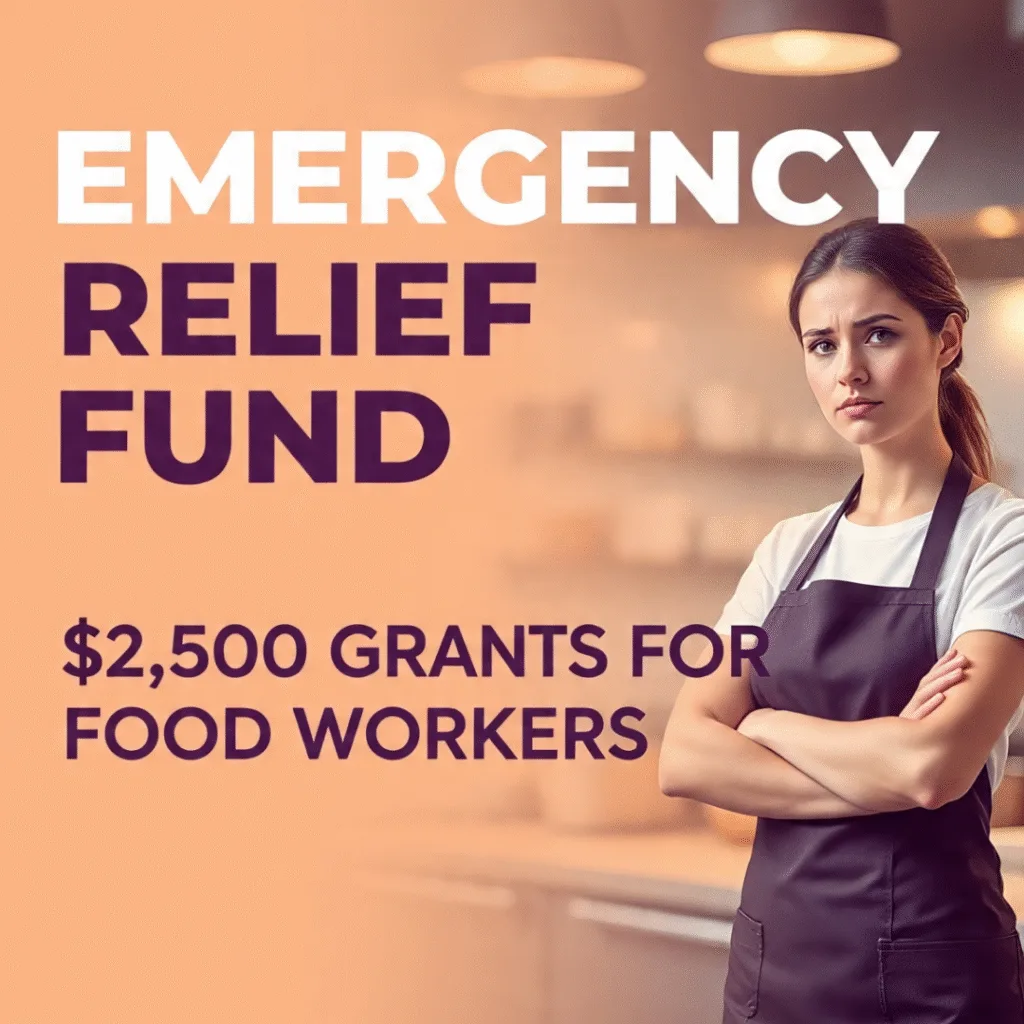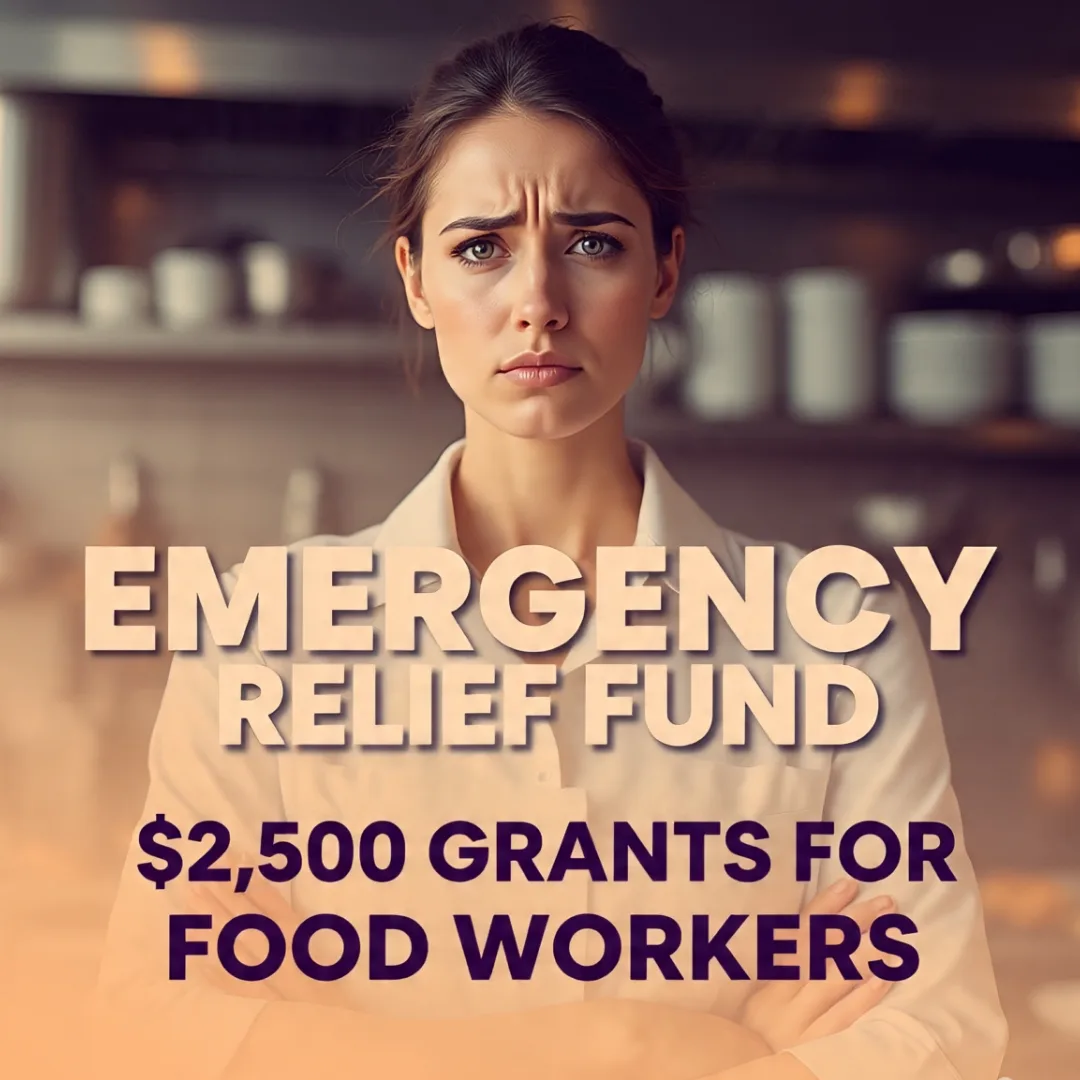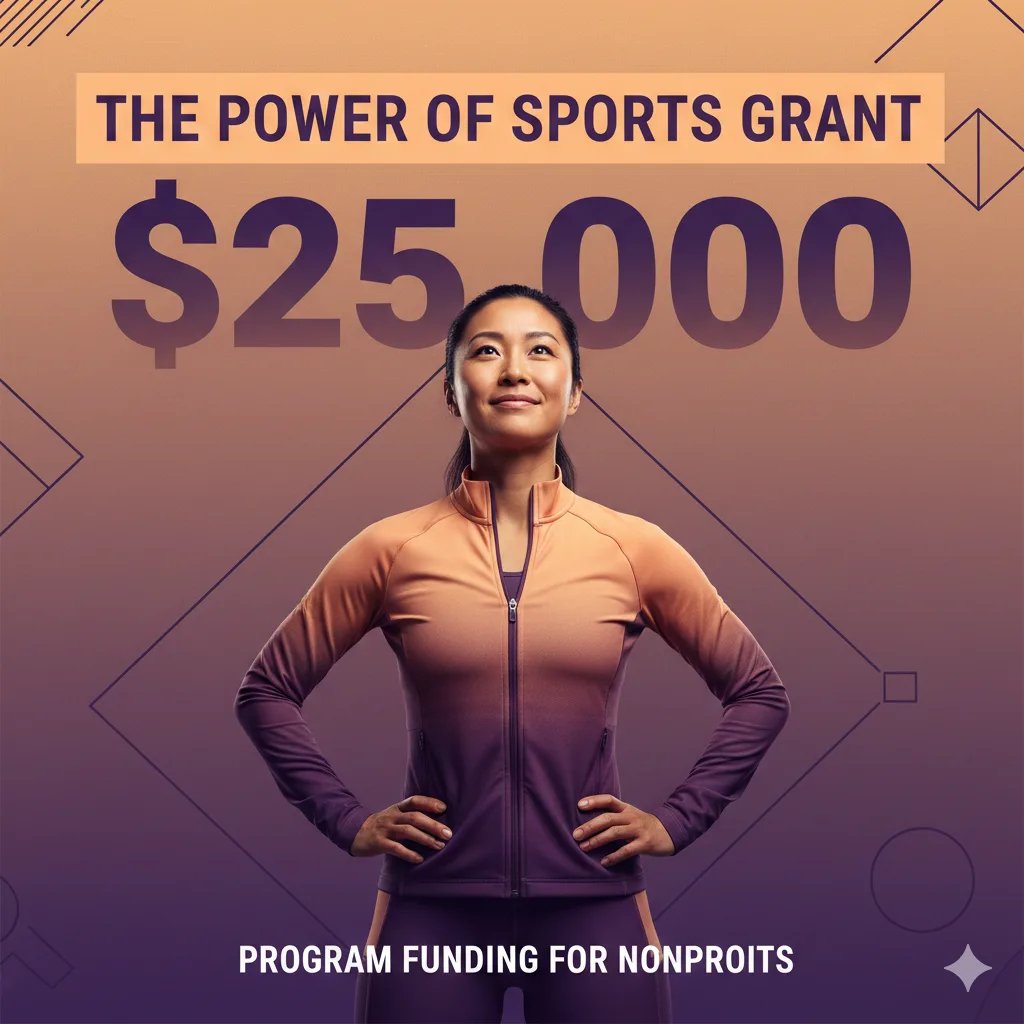
Southern Smoke Emergency Relief Fund: $2,500 Grants for Individuals in Food & Beverage Industry
Emergency relief grants up to $2,500 for food & beverage workers in crisis.
Grant Overview
Direct Financial Relief for Food Service Workers Facing Unexpected Hardships
Grants for individuals in the food industry are tough to find. The restaurant industry faces a significant mental health crisis, with up to 90% of workers experiencing mental health and addiction issues, and Southern Smoke Foundation gets it. They’ve put over $14.5 million into workers’ pockets since 2015. Real money. Real fast.
Working your ass off 60 hours a week in a kitchen that’s hotter than hell, serving people who don’t appreciate you, and then BAM – something happens that threatens everything you’ve built. That’s exactly why the Southern Smoke Emergency Relief Fund exists – they know what “86’d” means. They understand the chaos of restaurant life because they ARE restaurant people.
Average payout hits $2,500. Sometimes more, sometimes less. Depends on your crisis and their current funding. But here’s the thing – unlike most grants for individuals that take months to process, these folks move when you need them to move.
Donor: Southern Smoke Foundation
Focus: Emergency financial assistance, food service workers, restaurant industry relief, hospitality grants, crisis funding, individual assistance
Region: United States (all 50 states), Washington D.C.
Eligibility: Working adults in food and beverage industry experiencing crisis
– Currently employed in food/beverage industry (minimum 30 hours per week)
– Employment history of at least 6 months in F+B sector
– Experiencing unforeseen crisis within past 6 months
– Crisis types include: accident, illness/injury, housing crisis, natural disaster, victim of crime
– Must provide pay stubs documenting employment
– Can apply once every 12 months (maximum twice in 4-year period)
— Business owners eligible for personal expenses only (not business costs)
— Self-employed workers must meet additional documentation requirements
Benefits: Direct financial assistance for crisis-related expenses
– Financial Award: Average $2,500 (amount varies based on need and circumstances)
– Emergency Coverage: Rent, utilities, medical bills, groceries, transportation, childcare
– Mental Health Support: Access to “Behind You” counseling program in select states
– Flexible Use: Funds can cover any legitimate crisis-related expense
– Fast Processing: Urgent cases prioritized, funds disbursed quickly upon documentation
Deadline: Rolling (applications accepted year-round, must apply within 6 months of crisis)

Why This Grant Exists (And Why You Need It)
Chris Shepherd started this after watching his friend Antonio Gianola get diagnosed with multiple sclerosis. Sometimes life just hits you sideways, and Shepherd knew the food industry doesn’t have safety nets like other jobs do.
Think about it. Median pay for core front-line fast-food jobs is $8.69 an hour and an estimated 87 percent do not receive health benefits through their employer. You get hurt, you’re screwed. Simple as that.
But the statistics get worse when you dig deeper. Restaurant workers’ low wages leave many either poor or near-poor. So when crisis hits – and it always does eventually – there’s nowhere to turn.
Q: What counts as a “crisis” exactly?
A: Car accident. Cancer diagnosis. Your apartment building caught fire. Hurricane destroyed your house. Got assaulted walking home from work. Basically, anything that wasn’t your fault but messes up your finances.
The Application Reality Check
First thing they do? Check your pay stubs, just like most grants for individuals require. Six months worth. Not five and a half months. Not “approximately” six months. Exactly six months.
Why? Because too many people try to game the system. They need proof you’re actually in the industry, not someone who worked at McDonald’s for three weeks last summer.
Once that clears, you get assigned a case manager. This person becomes your advocate. They’ll help you organize paperwork, explain what documentation you need, and build your case for the awards committee.
The committee reviews everything anonymously. They don’t know your name, just your situation. This prevents bias that can happen in other individual assistance programs.
Q: How long does this actually take?
A: If you’re about to be evicted tomorrow, they fast-track it. Normal cases take 2-3 weeks once you submit complete documentation.
What They Really Want to See
Your statement of need should read like you’re explaining to your best friend. Skip the formal grant-speak that works for business applications. Tell them what happened. When it happened. How much money you need. When you need it by.
“I broke my leg on March 5th and can’t work for 6 weeks. Need $1,800 for rent and utilities to avoid eviction” works infinitely better than “I am experiencing temporary financial hardship due to a workplace injury.”
Document everything. Photos of damage. Copies of medical bills with the important parts highlighted. Eviction notices. Insurance claim forms. The more visual proof you have, the stronger your case becomes.
Mental Health Support That Actually Makes Sense
Food service workers are on the brink of a mental health crisis, dealing with depression, anxiety, and substance abuse at alarming rates. Most therapy programs don’t get restaurant culture.
“Behind You” does. Currently available in 13 states, this program connects you with counselors who understand why you can’t just “take a mental health day” when you’re scheduled to work a double.
They get that kitchen culture often sees asking for help as weakness. They understand the pressure of performance during rush periods. Most importantly, they know how financial stress amplifies everything else.
The program has provided over 7,840 counseling sessions, making a real difference in people’s lives. Given that 60% of servers at upscale restaurants report having at least one mental health problem, this service isn’t just nice to have – it’s absolutely essential. More organizations need to step up like this.
Q: What if I don’t live in one of those 13 states?
A: Apply for mental health crisis funding through the main Emergency Relief Fund. They’ll help cover therapy costs.
Q: How much money can I actually get?
A: There’s no set amount. They scale the funding to fit your specific situation and needs. Some people get a few hundred dollars to cover a utility bill, while others might get several thousand for major medical expenses or rent after an eviction. It really depends on what you’re going through.
Q: What if I own my own restaurant or bar?
A: You can still qualify! They help business owners with personal expenses (not business costs) if you’ve been operating for at least 12 months from a commercial space and meet the other requirements. They understand that business owners often have very little personal safety net.
Q: How fast will I get the money if I’m approved?
A: They process applications as quickly as possible, often within days to weeks depending on urgency and how fast you can provide documentation. Life-threatening situations get immediate priority. They actually understand the word “emergency” which is refreshing.
Q: Do I have to pay this money back?
A: No, this is a grant, not a loan. You never have to repay the money you receive from Southern Smoke. It’s not a loan – it’s help when you need it most, no strings attached.
Q: What if I don’t live in one of the states where you offer mental health services?
A: You can still apply for financial assistance through the Emergency Relief Fund for mental health crises, even if you’re not in a state where they provide direct counseling services. They help people nationwide regardless of location.
The Real Mental Health Stats
Here’s what nobody talks about: people of lower socioeconomic status have a higher likelihood of developing and experiencing mental health problems. And food service workers consistently rank among the lowest-paid in most states.
The combination creates a perfect storm. Financial stress triggers mental health issues. Mental health issues affect work performance. Poor performance leads to reduced hours or job loss. Job loss creates more financial stress.
Strategic Application Tips That Actually Work
Timing matters more than you think. They receive more applications around holidays and summer months, so competition increases during these periods.
But don’t wait if you’re facing immediate deadlines. Apply as soon as possible after your crisis occurs. The six-month window starts ticking from the date of your emergency, not when you discovered this program.
Q: Can I apply for help with multiple expenses?
A: Absolutely. Most successful applications include 3-4 different crisis-related costs.
Organize your documentation like you’re training a new server. Create clear sections for each type of document. Label everything. Make it easy for your case manager to find what they need quickly.
Common Mistakes That Kill Applications
Incomplete employment verification tops the failure list. Missing even one pay stub from your six-month history pauses everything. This happens in 40% of individual grant applications across all programs.
Vague crisis descriptions come second. “Financial hardship” tells them nothing useful. “Appendectomy on January 15th resulted in $3,200 in medical bills not covered by insurance, due March 1st” gives them something concrete to work with.
Late applications waste everyone’s time. The six-month deadline isn’t flexible. If your crisis happened 6 months and 1 day ago, you’re automatically disqualified.
The Money Details (What You Actually Get)
Awards typically range from $500 to $4,000, averaging $2,500. The amount depends on your documented need and their current funding levels. They don’t publish exact formulas because every situation is different.
Housing crisis typically gets more money than medical bills. Natural disaster victims often receive maximum awards. Job loss due to injury falls somewhere in the middle.
They send money via direct deposit to your bank account. No checks to wait for or cash. Funds usually arrive 24-48 hours after approval.
Q: Do I have to pay this back?
A: No. This is a grant, not a loan. No repayment required ever.
Grant Award Calculator
Based on recent award data, here’s typical funding ranges:
- Housing Crisis (eviction/foreclosure): $1,500-$3,500
- Medical Emergency: $800-$2,800
- Natural Disaster: $2,000-$4,000 (maximum awards)
- Job Loss/Injury: $1,000-$2,400
- Transportation (car repair/replacement): $600-$1,800
Note: Actual awards determined by anonymous committee review of documented need.
Alternative Funding Sources to Stack
Don’t put all your eggs in one basket. Modest Needs provides similar assistance for working individuals with different eligibility criteria. You might qualify for both.
The Emergency Rental Assistance Program distributed $30 billion with over 4.7 million payments made to households, but most food service workers don’t know about these federal programs. Professional grant research can uncover additional opportunities you’re missing.
Local United Way chapters often maintain emergency assistance funds specifically for working families facing crisis. California residents have access to multiple state-level programs that complement Southern Smoke funding.
Q: Can I apply to multiple programs simultaneously?
A: Yes, but be honest about it. Most programs ask if you’ve applied elsewhere.
Stacking Strategy That Works
Apply to Southern Smoke first since they move fastest. While waiting for their decision, research local emergency assistance programs in your area. Many people successfully combine 2-3 funding sources to fully address their crisis.
Religious organizations often maintain discretionary funds for community members facing hardship, regardless of whether you attend services. These complement formal grant programs beautifully.
Honestly, navigating multiple funding sources while dealing with a personal crisis can feel impossible. If you’re serious about maximizing all available resources and want professional guidance through the process, that’s exactly what we do at Grantaura. Sometimes expert help makes the difference between partial relief and complete recovery.
Past Recipients and Real Impact
Since 2015, they’ve distributed $14.5 million to thousands of food and beverage workers nationwide. These numbers represent real people who avoided eviction, covered cancer treatments, and rebuilt after natural disasters.
The foundation doesn’t publish recipient names for obvious privacy reasons, but case studies reveal the program’s scope. Line cooks dealing with diabetes complications. Servers recovering from car accidents. Bartenders whose California homes burned in recent wildfires.
Recent reporting shows 362 individuals received grants totaling over $1 million in their last funding cycle. Average processing time was 18 days from complete application to fund disbursement.
Q: What happens if they reject my application?
A: They explain exactly why and tell you when you can reapply. Sometimes it’s just missing documentation.
Application Timeline and Deadlines
Applications accepted continuously throughout the year. No seasonal funding cycles to worry about. The critical deadline is six months from your crisis date. Hurricane and wildfire victims often receive extended windows based on disaster impact assessments.
Natural disasters trigger special procedures. FEMA provided $319.5 million for emergency management in FY 2024, but individual assistance programs like Southern Smoke often move faster than federal bureaucracy.
Case managers prioritize applications based on urgency level, not submission order. Life-threatening situations bypass normal processing queues entirely.
What “Urgent” Actually Means
Eviction notice with court date next week? Urgent. Medical procedure scheduled that you can’t afford? Urgent. Utilities shut off and you have young children? Urgent.
General financial stress from accumulated debt? Not urgent in their system. They focus on acute crisis situations rather than chronic financial problems.
Documentation Requirements Explained
Six months of pay stubs means exactly that. If you have direct deposit, print bank statements showing payroll deposits. Self-employed applicants need additional business documentation including EIN letters and P&L statements.
Crisis documentation varies by situation. Medical emergency requires bills, insurance explanations of benefits, doctor notes about work restrictions. Hurricane damage needs insurance claims, FEMA documentation if applicable, repair estimates.
Housing crisis documentation includes lease agreements, eviction notices, mortgage statements, utility shutoff notices. The more official documents you provide, the stronger your case becomes.
Q: What if I lost documents in whatever caused my crisis?
A: Contact your case manager immediately. They can help you obtain replacement documents from various sources.
Check Your Eligibility
This interactive tool walks through Southern Smoke Foundation’s specific eligibility requirements using simple questions. After confirming eligibility, access our assessment form where Grantaura experts review your situation and provide personalized application guidance. Professional review significantly increases your approval chances.
21 More Emergency Grants for Individuals Opportunities
- Modest Needs Self-Sufficiency Grants: $1,000 Emergency Relief for Working Americans: Perfect complement to Southern Smoke for individuals earning just above poverty level. Provides critical financial support for unexpected expenses that could derail financial stability. Working individuals who earn too much for traditional welfare but too little for financial security qualify for targeted assistance with specific emergency costs.
- Etsy Emergency Relief Fund at CERF+: $2,000 Disaster Recovery Grants: Supporting US Etsy sellers with emergency financial assistance to recover from natural disasters and unforeseen crises, similar to Southern Smoke’s industry-specific approach but for creative entrepreneurs.
- American Legion Auxiliary Emergency Fund: $3,000 Crisis Assistance: Provides emergency financial assistance up to $3,000 for ALA members facing disaster or hardship, offering another option for individuals in crisis situations.
- Binc Foundation Grants: Emergency Aid for Bookstore Workers: Offers financial assistance to bookstore and comic shop employees during personal crises, mirroring Southern Smoke’s industry-specific emergency relief model but for the literary world.
- Rauschenberg Medical Emergency Grants: $5,000 for Artists: Provides up to $5,000 for US visual artists, choreographers, and filmmakers facing medical emergencies, similar to Southern Smoke’s crisis-focused approach but for the arts community.
- Authors League Fund: Emergency Grants for Writers: Offers interest-free, no-repayment financial assistance to professional writers facing emergencies, complementing the range of individual crisis grants available across different professions.
- Bill Pulte Foundation Financial Hardship Grants: Offers grants for housing, utilities, medical bills, or funeral costs during unexpected hardships, providing another resource for individuals facing various types of crises.
- American Red Cross Emergency Financial Aid for Military: Access immediate emergency financial assistance through the Red Cross Hero Care Center, available 24/7/365 for active duty, veterans & families nationwide.
- Grants for Individuals: Complete Funding Directory: Explore our comprehensive database of individual grants covering everything from emergency relief to education funding, with new opportunities added daily to help you find the right fit.
- Mental Health Grants: Wellness & Recovery Funding: Access funding specifically for mental health support and treatment, expanding on the mental health aspect that Southern Smoke addresses through their Behind You program across more states.
- Restaurants Care Resilience Fund: $5000 Grants for CA: Since 2021, this vital support system has distributed over $7.3 million in grants to 1,603 local food establishments, showing another approach to industry-specific emergency relief.
- United States Federal Emergency Relief Programs: State-specific emergency assistance available nationwide including FEMA individual assistance and regional crisis relief organizations. Includes both federal and state emergency funds providing direct financial support to individuals facing unexpected hardships. Comprehensive database of verified government programs.
- WealthySingleMommy $500 Monthly Emergency Grants for Single Mothers: Monthly grants specifically for single mothers facing immediate financial crisis. Streamlined application process requiring only identification as single mother needing emergency assistance. Distributed over $48,000 to single mothers nationwide since program inception during COVID-19 pandemic.
- NASE $4,000 Monthly Grants for Individual Entrepreneurs: Individual entrepreneurs can access monthly funding opportunities plus professional development resources. Ideal for individuals running small businesses who need both financial assistance and expert guidance during crisis recovery periods. Membership required but application process simplified for rapid funding access.
- Women’s Crisis Relief and Emergency Support Grants: Gender-specific grants for women facing crisis situations including domestic violence recovery and single mother assistance. Specialized programs designed to address unique financial challenges women face during emergencies. Multiple funding sources available for women-owned businesses and female entrepreneurs.
- California Individual Emergency Assistance Programs: State-specific grants including emergency rental assistance and disaster recovery funding for California residents. Multiple state-funded programs designed to prevent homelessness and provide crisis intervention. Comprehensive coverage of wildfire, earthquake, and flooding relief programs.
- Texas Emergency Relief for Individuals and Families: Texas-based assistance programs including natural disaster recovery and housing crisis prevention. Multiple state and local funding sources available for residents facing unexpected financial emergencies. Specialized hurricane and tornado recovery programs with expedited processing.
- New York State Individual Crisis Funding Database: New York emergency assistance including rental relief and medical crisis funding for individual residents. Comprehensive database of city, county, and state programs providing direct financial support during emergencies. Specialized programs for NYC residents facing housing instability.
- Florida Individual Emergency Assistance Directory: Florida-specific emergency relief including hurricane recovery and housing assistance for individual residents. Multiple funding sources through state agencies, nonprofits, and federal programs operating specifically in Florida. Expedited processing for natural disaster victims.
- Student Emergency Aid for Individual Crisis Situations: Educational emergency assistance for individual students facing financial crisis during studies. Includes emergency aid funds, housing support, and food security programs designed to prevent dropout during difficult periods. Available at community colleges, universities, and trade schools nationwide.
- Professional Grant Consultation for Individual Emergency Funding: Expert assistance navigating multiple individual grant programs simultaneously. Personalized research and application strategy development for individuals facing complex crisis situations. Proven track record of helping individuals secure maximum available funding from multiple sources.
Individual emergency funding exists at federal, state, and local levels across the United States, but most people don’t know where to look. Grantaura offers the most comprehensive, free database of active grants for individuals across the United States, with new opportunities added every single day. Whether you’re dealing with an emergency like those covered by Southern Smoke or looking for funding for education, business development, or personal growth, our platform connects you with vetted, legitimate funding opportunities that match your specific needs and circumstances. No more endless searching – just real help when you need it most.
Terms
- Crisis Definition: An unexpected emergency creating immediate financial hardship occurring within six months of application date. Must be specific event rather than general ongoing difficulty. Examples include sudden job loss due to injury, natural disaster damage, or major medical diagnosis requiring immediate treatment. Chronic financial problems don’t qualify under this definition.
- Food and Beverage Industry Scope: Broad definition including restaurant workers, farmers, bartenders, servers, cooks, dishwashers, food truck operators, catering staff, brewery employees, winery workers. Also covers agricultural workers providing goods to food service establishments and food distribution workers. Self-employed food business owners qualify with additional documentation requirements.
- Employment Verification Process: Documentation proving minimum 30 hours weekly employment in qualifying industry for six consecutive months minimum. Requires pay stubs, W-2 forms, or employer verification letters showing consistent work history and income. Self-employed applicants need business documentation including EIN letters and profit/loss statements.
- Case Manager Role: Dedicated Southern Smoke Foundation staff member providing personalized guidance throughout entire application process. Helps gather required documentation, explains eligibility requirements, and advocates for applicants during committee review. Maintains confidential communication with applicants from submission through final decision.
- Awards Committee Structure: Anonymous panel of diverse food and beverage industry representatives reviewing completed applications. Committee evaluates applications based on documented need, financial circumstances, and available funding resources. Maintains applicant anonymity during decision-making process to prevent bias.
- Crisis Documentation Requirements: Supporting evidence proving emergency situation requiring financial assistance. May include medical bills, eviction notices, insurance claims, police reports, employer termination letters. Visual documentation like photos of damage or highlighted bill amounts strengthens applications significantly. More documentation typically leads to faster processing.
- Financial Need Assessment Process: Evaluation determining appropriate grant amount based on household income, monthly expenses, crisis costs, and other available resources. Committee considers complete financial picture when calculating award amounts rather than predetermined formulas. Individual circumstances heavily influence final award decisions.
- Rolling Application System: Continuous application acceptance throughout year without specific deadlines or funding cycles. Applications processed in order of completion and urgency level rather than predetermined cutoff dates. Natural disasters may trigger special deadline extensions based on community impact assessments.
- Household Income Calculation: Total earnings of all household members from employment, benefits, and other income sources. Used to determine financial need and appropriate assistance level including wages, tips, unemployment benefits, and regular income streams. Self-employment income requires additional business documentation for verification.
- Behind You Mental Health Program: No-cost counseling service providing therapy specifically for food and beverage workers. Available in 13 states with trained counselors understanding industry-specific stress factors and workplace culture challenges. Workers in non-covered states can apply for mental health crisis funding through main Emergency Relief Fund.
- Emergency Relief Fund History: Southern Smoke Foundation’s primary assistance program providing direct financial support since 2015. Distributed over $14.5 million to thousands of food and beverage workers nationwide facing crisis situations. Established by restaurateur Chris Shepherd after friend’s multiple sclerosis diagnosis revealed industry vulnerability.
- Eligible Crisis Categories: Specific emergency types qualifying for assistance including accidents, illnesses, injuries, housing crises, natural disasters, job loss beyond applicant control. Also covers being victim of crime or violence, with documentation required proving crisis occurrence within six-month window. Chronic situations or self-inflicted problems typically don’t qualify.
- Grant Award Ranges: Funding amounts provided to approved applicants averaging $2,500 but varying based on individual circumstances and documented need. Awards scaled to address specific crisis-related expenses and household financial situation rather than fixed amounts. Housing crises often receive higher awards than other emergency types.
- Application Timeline Requirements: Six-month window from crisis occurrence to application submission deadline ensuring funding reaches people in active emergency situations. Natural disasters may receive extended deadlines based on impact assessment and community recovery needs. Timeline strictly enforced to maintain program focus on acute rather than chronic problems.
- Supporting Documentation Standards: Required paperwork including lease agreements, mortgage statements, utility bills, medical records, insurance documents proving crisis situation. More comprehensive documentation typically leads to faster processing and higher award amounts. Case managers help applicants identify and obtain necessary supporting evidence.
- Self-Employed Eligibility Criteria: Special category for business owners and independent contractors in food and beverage industry requiring additional verification. Requires EIN letter, profit and loss statements, business lease agreements, and proof of operation for minimum 12 months. Personal expenses only covered, not business-related costs or equipment.
- Privacy Protection Measures: Confidentiality procedures ensuring applicant information remains secure and anonymous throughout process. Only case management team accesses complete applications, with awards committee reviewing anonymized summaries during decision-making. Personal identifying information protected from unauthorized disclosure.
- Funding Limitations Structure: Restrictions including one grant per 12-month period maximum, two grants within four-year period maximum. Prohibition on using funds for business expenses rather than personal crisis-related costs. Designed to ensure funding reaches maximum number of individuals while preventing program abuse.
- Direct Deposit Processing: Preferred fund disbursement method sending approved amounts directly to recipient bank accounts for immediate access. Provides faster, more secure transfer than traditional check processing methods. Funds typically arrive 24-48 hours after final approval notification.
- Crisis Recovery Planning: Comprehensive approach addressing emergency situation including immediate financial relief and connection to additional resources. May include long-term stability planning and referrals to ongoing support services and financial counseling. Holistic approach recognizing that single grants often can’t address all aspects of major crisis situations.
Author
Imran Ahmad launched Grantaura after seeing how fast financial disasters can destroy people who work in unstable industries. During the pandemic, he watched restaurant workers – people who’d worked doubles for years – suddenly face eviction because one crisis wiped out months of careful budgeting. The food service industry operates without traditional safety nets, and Imran recognized that knowing which emergency programs exist and how to access them quickly often determines whether someone recovers or loses everything. Through Grantaura’s platform and consultation services, he’s helped hundreds of individuals navigate emergency funding when they need it most, understanding that sometimes the difference between financial survival and complete collapse comes down to having the right information at the right time.
How to apply for this grant
We are your trusted grant application partners. You can navigate the entire grant application process with our expert guidance through this simple 5-step process.
Step 1: Application Form
Fill out the “Apply for this grant” form with your information and grant requirements.
Step 2: Eligibility Assessment
Our grant experts will assess your eligibility and notify you via email.
Step 3: Expert Consultation
A dedicated grant expert will be assigned to discuss next steps for your application.
Step 4: Application Submission
Our expert will help you complete and submit your application with all required materials.
Step 5: Final Decision
The grant committee will make their decision and notify successful applicants.













